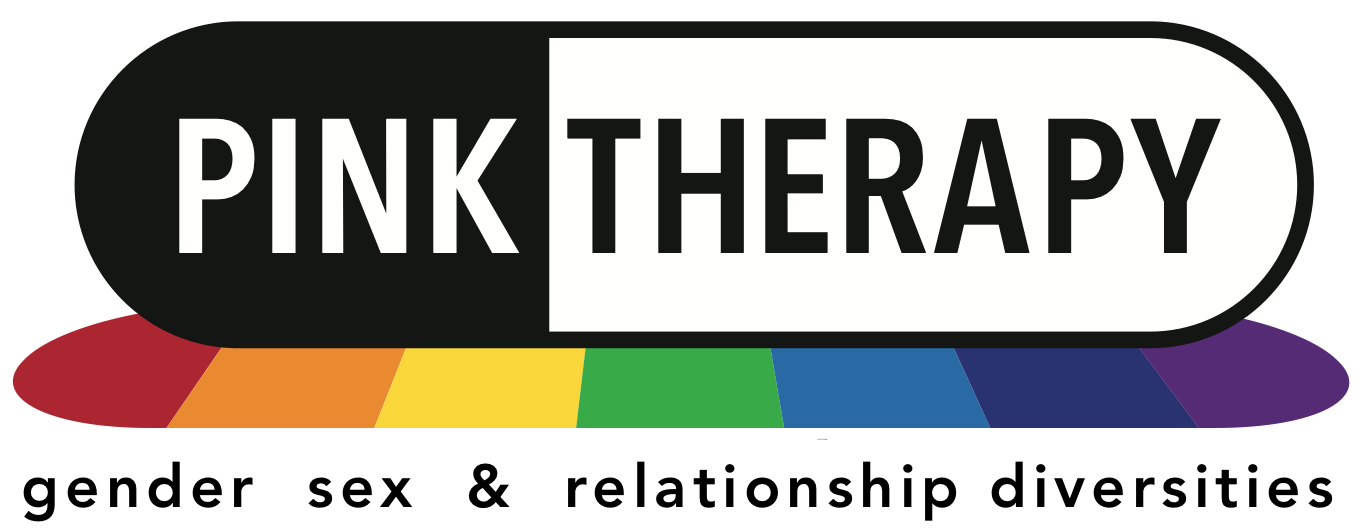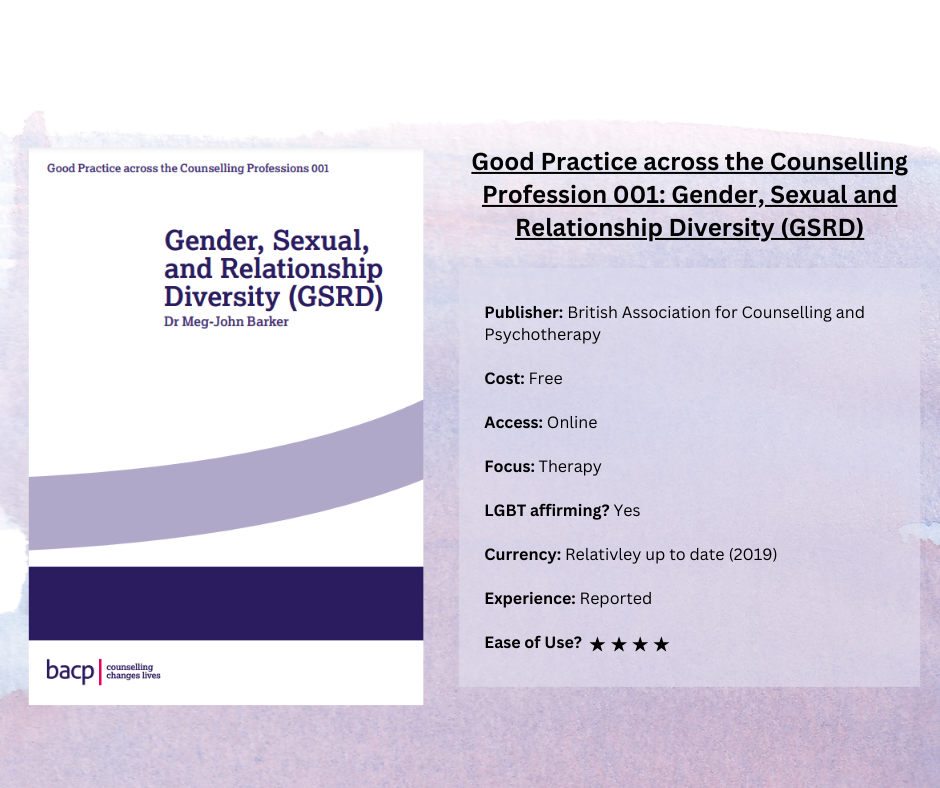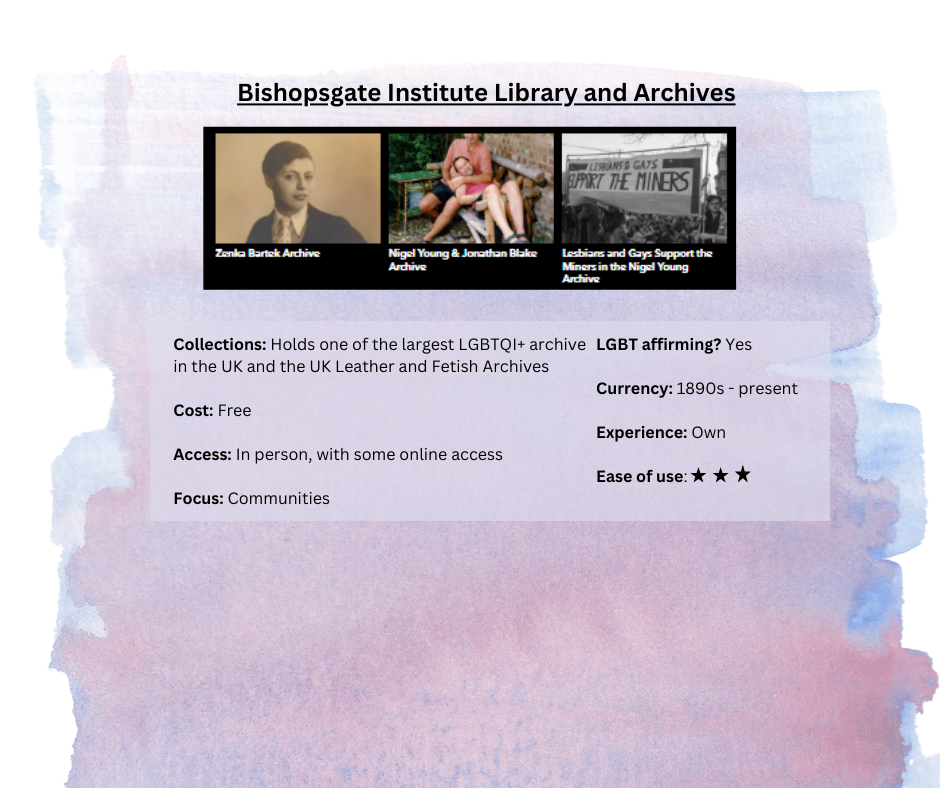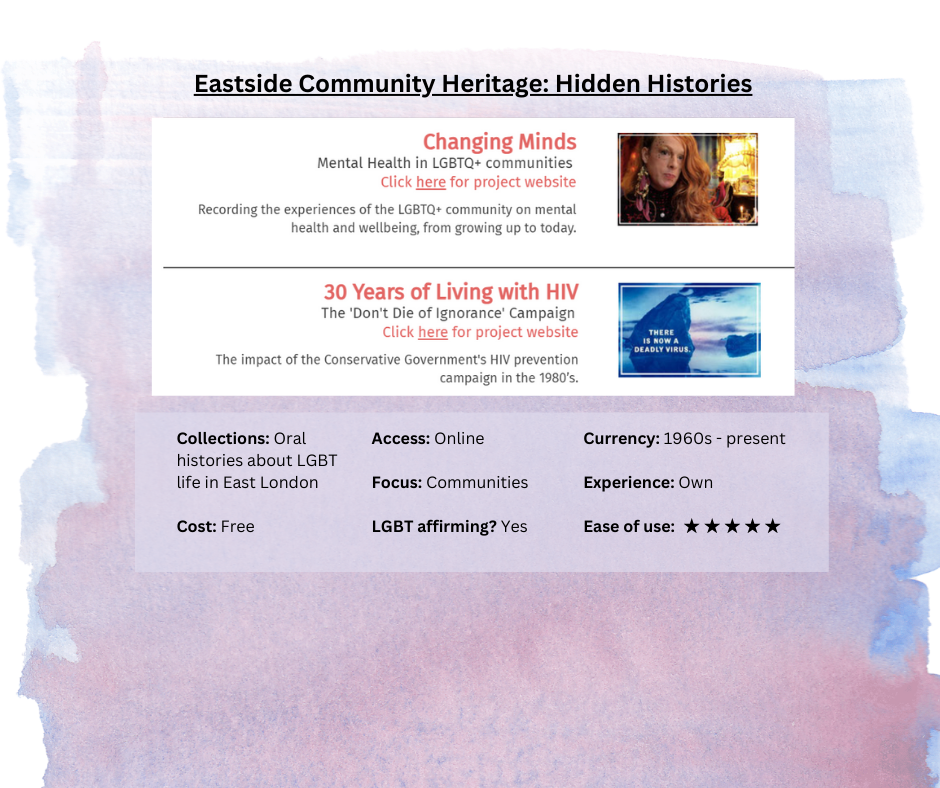Author: Sarah Pipkin, Outreach and Exhibitions Coordinator, UCL Special Collections, University College London. The resource was adapted from an assessment part of the author’s studies for an MA in Library and Information Studies at University College London.
Content warning: The resources discussed cover the history of marginalized relationship types, including BDSM and sex work. All resources are appropriate for a professional context. However, some pages in the Bishopsgate Institute Archives Guides include sexually explicit images and frank discussions of sexual relationships.
A key part of being a GSRD Therapist is staying up to date on current therapeutic practices and learning about communities covered by the GSRD framework. The resources below can support your practice and help you meet the seven key components of being a GSRD therapist.
All recommended resources are free to use, however, you may need to travel to a local or specialist library. Wherever possible, online alternatives are flagged.
The resources recommended assume that you are a professional in a UK context. If you would like to explore similar resources, but you’re not based in the UK, talk to your local librarian!
General Guides
Good Practice across the Counselling Profession 001: Gender, Sexual and Relationship Diversity (GSRD)
“Gender, Sexual and Relationship Diversity (GSRD)” is a free, online resource provided by the British Association for Counselling and Psychotherapy (BACP) as part of its series of good practice guides. It is written in a conversational style and is well laid out, with clear subject headings and a table of contents. However, there are intentionally very few in-text citations. This creates problems of reliability when controversial subjects are discussed.
The BACP guide ends with a summary of good practice and outlines suggestions for improving therapeutic practice. Definitions provided are broad enough that they are unlikely to become immediately out of date. However, the guide is five years old and there are some dead links throughout.
Other suggested resources
Sage Handbook of Counselling & Psychotherapy, 5th edition
The Sage Handbook of Counselling & Psychotherapy includes a chapter on GSRD therapy. It is more recent, so the practices described will be more up to date. It’s not available for free online, however, your local public library is likely to have a copy in their collection.
Relationally Queer: A Pink Therapy Guide for Practitioners
Relationally Queer covers a wide range of topics applicable to GSRD therapists, including non-monogamy, different LGBT+ identities, and more. However, there are currently no UK public libraries with a copy in their collection. In some areas it may be cheaper to buy a copy than request via inter-library loan.
Databases: Access to Research
Access to Research is a database that provides free access to peer-reviewed journals to members of UK public libraries. Major academic publishers participate in the scheme. As of January 2020, 95% of UK public libraries subscribe to Access to Research, so you should be able to access it in most areas of the UK.
While it is free of charge, you must use a public library computer to use Access to Research. The database can be searched from home, but articles cannot be accessed from home or on personal laptops. Additionally, you can only make a single copy of an article.
The database includes almost 200 psychology journals, such as the Journal of gay & lesbian mental health, Journal of sex & marital therapy and Sexual and relationship therapy. However, be aware that the database can use outdated terminology in places.
Reliance on peer reviewed research, rather than “pop psychology”, is a key component of being a GSRD therapist. However, be aware that peer reviewed literature is not free of anti-LGBT biases.
If you’re not sure how to use this database, or are struggling with searching, speak to your local public librarian and they’ll be able to help.
Related resources
University alumni access
If you have a university degree, you may be able to access some databases as an alumni. The specific databases included will depend on your university. We suggest you check your university library website for more information or contact the alumni office.
Social Media: YouTube
YouTube is increasingly becoming a starting point for research, as well as a way to connect with new communities. 96% of adults in the UK with internet access use YouTube at least once a month – meaning you are likely already familiar with the platform yourself!
YouTube hosts secondary and primary sources about GSRD communities. Sometimes, different types of resources can be mixed into the same video. It can also serve as a jumping off point for identifying other platforms for exploration. Podcasts will often post recordings to YouTube and large creators may mention Patreon or Discord accounts, all of which can serve as individual social media communities.
However, be aware that content creators focus on having a “right” or “wrong” opinion about GSRD-related topics. Internet content is subject to censorship, so some communities will use alternative language to disguise their content. There is no fact checking system on YouTube, so plagiarism or misinformation is often only exposed by other content creators. However, as your client’s introduction through GSRD communities may be through unreliable media sources, it may be useful to engage with inaccurate, but popular, content.
Some recommended channels are below, though keep in mind that these recommendations are made by a librarian – not a GSRD therapist.
- Rowan Ellis.
- Bob the Drag Queen.
- Strange Aeons.
- Philosophy Tube – specifically “I Emailed My Doctor 133 Times”.
- Watts the Safeword
- Dominic Davies
Related resources
Tumblr
Tumblr has long served as home for developing GSRD communities, as its role as a message board can work more effectively as a place for people from marginalized communities to find support. Exact user age range is difficult to judge, but it currently seems to lean towards younger users.
Organisations / Institutional Resources
Three of the seven GSRD core competencies require exploration of specific communities. For this, primary sources held in archives or special collections libraries can be an invaluable resource. All the archives and libraries recommended are open to the wider public. If you’re not sure how to access a collection, write the library or archive you wish to visit, and they will be able to give you additional support!
Bishopsgate Institute
The Bishopsgate Institute’s library and archive includes one of the largest collections of LGBT archives in the UK and the only archive dedicated to BDSM/Kink communities. Collections range from the 1890s to the present day. Bishopsgate is free to use, however, require visiting the Institute’s London building. The library and archive are closed on weekends, though it is open late on Wednesday evenings.
The collections consist of primary sources, such as newspaper clippings, letters, diaries, photographs, and videos. Engaging with primary sources can reinforce and deepen your own knowledge about marginalized communities. However, as primary sources, they need a bit of interpretation – a document in isolation will not tell you the full history of a community.
Archive collections are generally named after the subject or donor, so you may need to spend some time reading collection descriptions to understand its relevant to GSRD history.
Selected material from the LGBTQI+ collections have been digitized and are freely available online. Bishopsgate also publishes blogs that highlight specific archives or themes in the collection. They also run events, such a tours of the LGBT+ and BDSM/Kink collections.
Related resources
No one institution will encompass the entirety of GSRD history. Below are other publicly accessible archives and library collections that may be relevant to you.
- London Metropolitan Archives
- LGBT collections at London School of Economics
- Manchester City Council LGBT resources and archives
- LGBT resource guide produced by Glamorgan Archives, Cardiff
- Lesbian Archive and Online LGBT resources at the Glasgow Women’s Library
- Digital Transgender Archive
Audio Visual / Oral History
Eastside Community Heritage
Eastside Community Heritage provides free, online collections of oral histories. It is an independent charity based in Stratford, London and much of the website is devoted to online collections of photographs, videos, and audio recordings. Collections focus on East London communities and cover a range of topics, including LGBT history.
Oral histories are organized by theme, including a collection about LGBT Mental Health. Projects with only a handful of recorded participants, such as “Being Civil in Redbridge”, makes an effort to show LGBT people from a range of backgrounds with both positive and negative coming out experiences.
Individual project websites could disappear as resources age. However, as Eastside also has a physical archive, hopefully the oral histories will remain accessible as technology changes.
Related resources
Final thoughts
While it may seem daunting at first, there are a wealth of free resources available to support GSRD professionals develop and improve their practice. If after looking at this list you’re still struggling to find resources, speak to your local librarian as they may be able to help.






